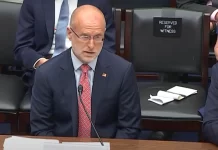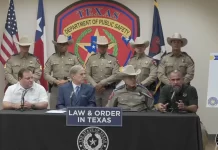Texas’ budget surplus of $27 billion should be returned to taxpayers, and spending be cut, a fiscal watchdog argues.
(The Center Square) – Texas is expecting a record $27 billion surplus for the 2022-23 biennium. While Gov. Greg Abbott and Lt. Gov. Dan Patrick say some of the surplus should be returned to taxpayers, a fiscal watchdog argues all of it should be returned. The state also should cut spending and reduce the size of state government, the watchdog says.
Texas Comptroller Glenn Hegar revised the state’s Certification Revenue Estimate after reporting record tax revenue pouring into the state every month.
Hegar says the legislature will have $149.07 billion in General Revenue-related funds available for general-purpose spending for the 2022-23 biennium. This includes a projected fiscal 2023 ending balance of $26.95 billion in surplus, an increase of $14.95 billion from last November’s projected surplus.
The revised estimate “is mostly driven by tax revenues that rebounded strongly in recent months,” he said, and that “many tax revenue categories reached their highest collections on record.”
Some of the “unprecedented windfall” should be returned to taxpayers, Patrick said.
“I have always believed returning money back to taxpayers does not grow government,” he said. While many in the legislature may want to spend it, he said, “I believe, first and foremost, any surplus should first go back to the taxpayers of Texas. Texas homeowners must receive tax relief before we commit to any new spending.”
Abbott last week said “a very large property tax cut was coming next session.”
Patrick also listed priorities for the surplus, including allocating an additional $4 billion for property tax relief and permanently increasing the homestead exemption to $60,000, with the ultimate goal of increasing it to $100,000. He also suggested suspending the state gas tax for the remainder of 2022 in addition to increasing spending on education.
“Of course we must continue to maintain our effort to secure the border where the federal government has failed,” Patrick added. “I still have concerns about a national recession but the Texas economy will always lead the nation with our conservative approach to spending and putting taxpayers first. This unprecedented windfall due to the hard work of Texas taxpayers and our growing economy will give us the funding we need to weather any future economic storm that the Nation may face.”
But Texans for Fiscal Responsibility is calling on Texans to reject “the status quo.” Its president, Tim Hardin, told The Center Square, that state lawmakers have claimed “they are for small government” but every year state government grows “more and more.”
While Republican leadership has claimed “they have passed historic property tax reform,” property taxes have only gone up.
Homeowners in Texas currently pay the sixth-highest property taxes in the U.S., with some seeing double digit increases in their bills in one year.
Property taxes have gone up nearly 200% in the last 20 years, Hardin said, “with no sign of stopping.” The “historic property tax reform” touted during the 2019 legislative session,“has resulted in no tax relief for anyone,” he said.
“Our tax problems can be solved the same way that we have to solve our personal budgets: cut spending. Not slow the rate of growth of spending,” he said, but “actually cut spending and reduce the size of government.
“We are literally drowning in surplus dollars and the legislature is already looking for ways to use that to grow government. Texans must demand our money back in the form of property tax relief and a significant reduction in the size of our government.”
His organization has proposed a “Texas Prosperity Plan” to reform the state budget process, which includes banning taxpayer funded lobbying, passing meaningful property tax reform, and freezing the state budget. The state budget has quintupled since 1990 and is on track to triple since 2000, Hardin said, as Texas’ population has increased by 40% over the last 20 years.
Originally published by The Center Square. Republished with permission. For more Budget & Tax News.










